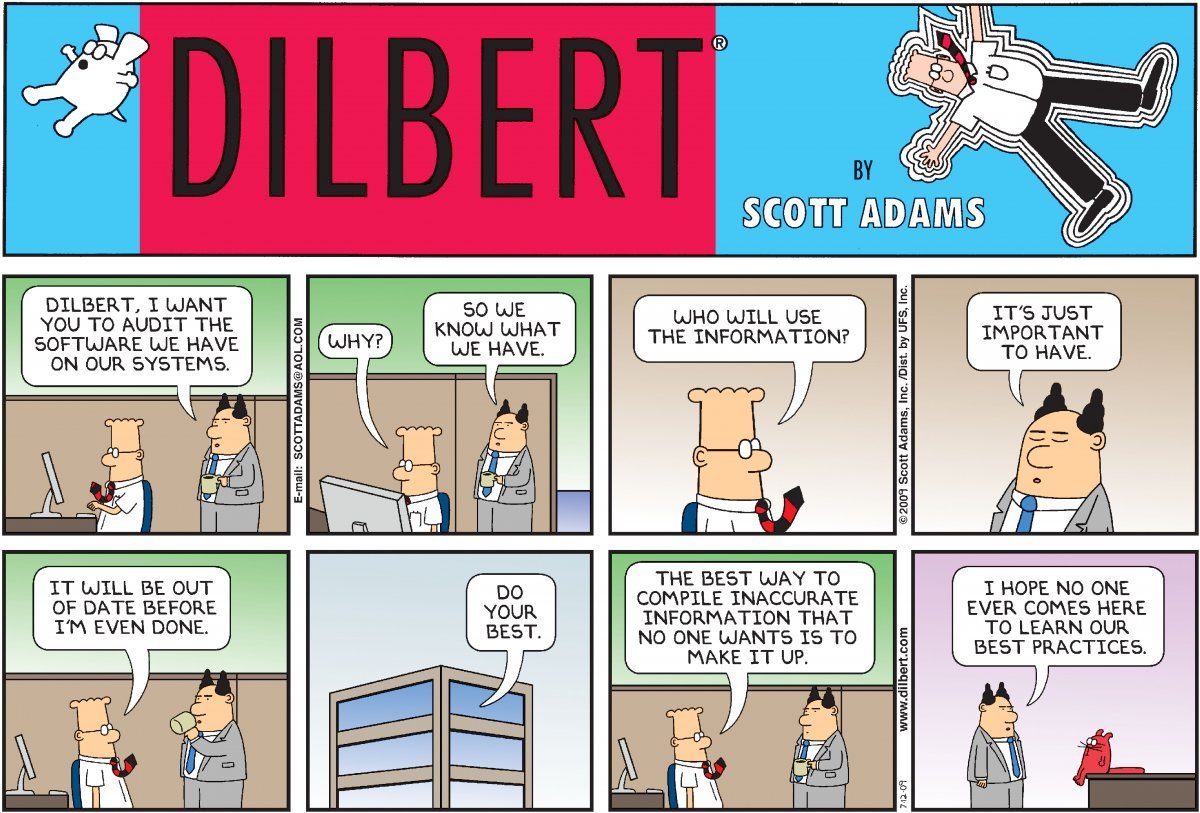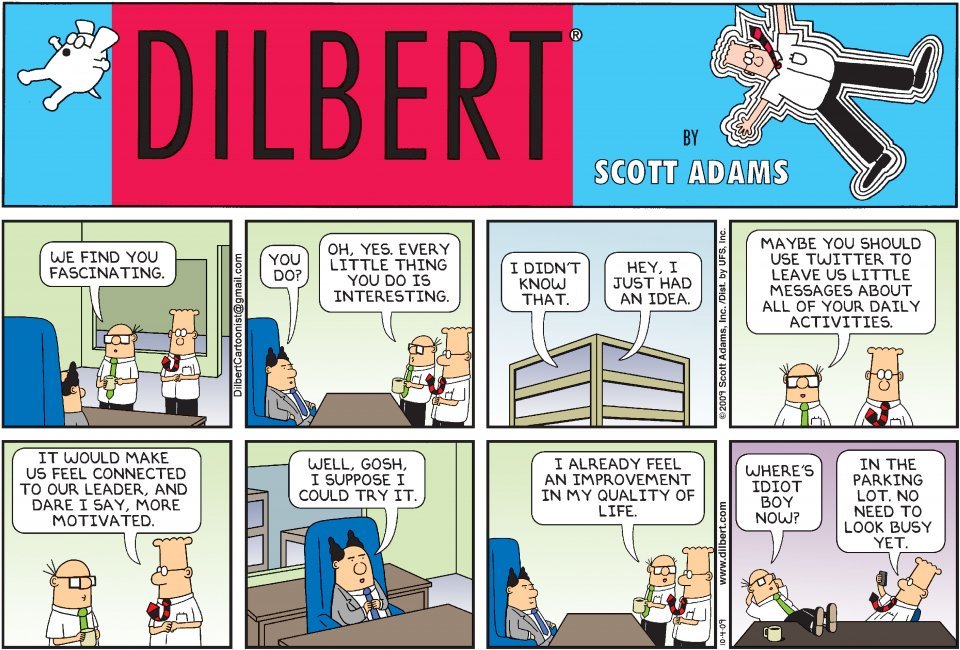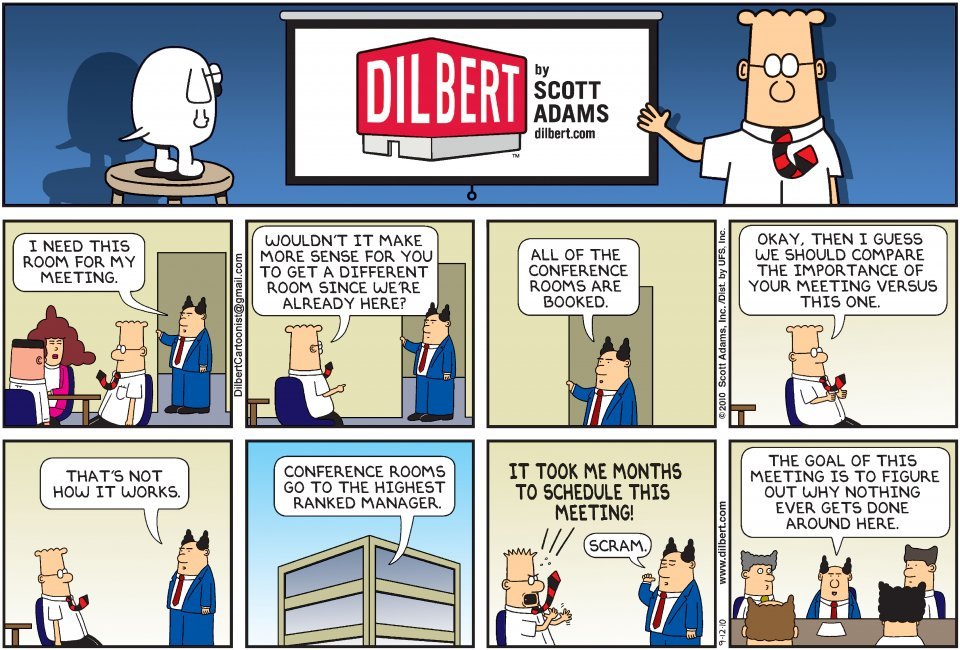Journal of Office Workers
Archive for October 16, 2014
10 Things to Know Before Starting Your First Job
![]() Originally posted on TIME:
Originally posted on TIME:
Answer by Michael Chen on Quora.
My first job was at a management consulting firm. Though I did not particularly enjoy these two years, I learned a lot of things that have been helpful as my career has progressed.
- Early on, attitude matters as much or more than actual output. No one likes working with a jerk, even if they are good. Sure, if you are extraordinary you can get away with it, but most of us aren’t THAT good at any one thing (like Michael Jordan, Tiger Woods, or Alex Rodriguez.)
- Until you are the CEO, regardless of your job title or job description, your actual job is to make your boss/supervisor’s life easier. The sooner you realize it’s about them, and not you, the smoother things will be.
- Take performance reviews with a grain of salt. They will never be perfectly accurate — as with all…
View original 427 more words
3 Questions to Ask When You Don’t Know What You Want to Do With Your Life
![]() Originally posted on TIME:
Originally posted on TIME:
This post is in partnership with The Muse. The article below was originally published on The Muse.
I started college as a musical theater major, but by the end of my freshman year, I knew I wasn’t supposed to have a career on stage. I dabbled in psychology before finding my calling in marketing.
A friend of mine, on the other hand, started her career as a marketer. But after picking up running, she’s in school to become a physical therapist. Another friend has been a software engineer by education and profession, and he recently transitioned into data science.
The thing we all had in common? At some point, we thought we had it all figured out—until we realized that our dream jobs weren’t our dream jobs anymore, and we had to start all over to determine how we wanted our career paths to look.
When you…
View original 874 more words
9 Essential Habits of Remarkably Effective People
![]() Originally posted on TIME:
Originally posted on TIME:
This post is in partnership with Inc., which offers useful advice, resources and insights to entrepreneurs and business owners. The article below was originally published at Inc.com.
There’s a huge biggest difference between being efficient and being effective. (Just ask Stephen Covey.)
Efficient people are well organized and competent. They check things off their to-do list. They complete projects. They get stuff done.
Effective people do all that … but they check the right things off their to-do list. They complete the right projects. They get the right stuff done.
They execute and produce what makes the biggest difference for their business … and for themselves.
Here are some of the traits of remarkably effective people, and why they’re so successful:
1. They always start with goals.
Effort without a genuine purpose is just effort. Effective people don’t just know what to do–they know why. They have…
View original 901 more words
5 Ways To Tell You’re All Grown Up Now
![]() Originally posted on Thought Catalog:
Originally posted on Thought Catalog:
Lately I’ve been wondering when exactly I started frowning upon some of my actions from when I was 17 years old. They made perfect sense to me then. And the 17-year-old me would probably think the 26-year-old me is boring and annoying.
I can’t determine exactly when this happened, but I can tell how I’m different and now I realize what older people meant when they used to tell me, “You’re too young now. You’ll see when you’re older.”
1. You have a different mindset.
It used to be all about boys and parties. My relationships with my girlfriends were shallow and I didn’t know how to choose the right people for myself. Come to think of it, I didn’t know what a right person is. My relationship with my family was shallow, I didn’t really appreciate them being in my life. They were just there. These days…
View original 421 more words
3 Things To ‘Listen’ For During Job Interviews
Like any other conversation, a job interview is a two-way street: It’s as much about how well you listen as it is about what you say. And there’s more to listening than simply hearing another person’s words. How interviewers sit, how they ask their questions, and what they do while listening to your answers can tell you an awful lot about the direction the conversation’s taking.
Related: 12 Quick Tips For Interviewing Like A Pro
Of course, during an interview, the manager is in the driver’s seat, so it’s critical that you’re able to read their cues. The Web is full of hints for figuring out whether someone’s paying attention to you or not: Are they making eye contact? Leaning forward as you speak? Nodding their head? All good things. But often, the message someone conveys is contained in ways that are more subtle.
3 Things To ‘Listen’ For During Job Interviews
Here are three things to bear in mind during job interviews:
1. Listen For The Hidden Question
No interview question is simple. In every case, the employer’s looking not only for insights into your skills and experience, but also for hints about how your thought process works, how committed you’ll be to your job, and how well you’ll fit into the company’s culture.
Keep that in mind as you listen to each question. If a manager asks you to describe a time you met an aggressive deadline, for instance, they’re also trying to get a feel for how well you work under pressure and how you work with others under less-than-ideal circumstances. It’s not simply a question about nuts and bolts.
So, don’t limit your answer to the obvious. Remember that during job interviews, explaining how you got to a particular point can be as important as showing that you got there in the first place.
2. Listen To Get Their Attention
Obviously, you want to keep the manager’s attention during the interview. Even if they’re one of those people who constantly checks their cell phone while they talk, you can pick up hints about whether they’re engaged in the conversation. The most obvious clue is whether they’re doing more than simply asking questions.
A true dialogue is more than a Q&A. It involves stories, comments - and answers - from both sides. If the manager seems to be following a script, break up his routine by asking questions yourself. For example, after answering that query about meeting deadlines, ask if the manager’s ever been in a similar situation, or whether you can expect to face tight deadlines as a part of the job at his company. If he asks for your opinion on a recent industry news event, inquire about his views after you’ve given him your own.
Always, you want the interview to be a true conversation. A manager is more apt to remember the candidate he engaged with than those who simply allowed themselves to be led through his checklist of questions.
3. Keep Them Focused
Pay attention for signs that you’re losing your audience whenever you need more than a few sentences to answer a question. Some clues are obvious. The manager’s eyes may wander, for example. Others are more subtle: Someone who’s been sitting forward may shift and begin rubbing the arm of their chair with their fingers.
Picking up on someone’s wandering attention will depend a lot on how well you read them. People differ, after all. A manager who’s comfortable multitasking may be carrying on an engaged conversation even if they’re checking their email while they talk. The trick is to look for signs that the rhythm has been broken. For example, if the multitasker allows pauses to creep into the conversation while he absorbs an email message, chances are you need to re-focus his attention.
Though the manager asks the questions during an interview, the job seeker has plenty of opportunities to direct the conversation. Always be on the lookout for hints about the interviewer’s interests and engagement. You’ll find them in what he does, as well as what he says.
This is a guest post.
Related Posts
#1 Tip For Acing An Interview: Mirroring
13 Interview Secrets For Introverts
5 Steps To Present Your Best Self During An Interview
Photo Credit: Shutterstock
The post 3 Things To ‘Listen’ For During Job Interviews appeared first on CAREEREALISM.
from CAREEREALISM http://ift.tt/1rxchWG
via IFTTT
Too Legit To Quit: 9 Reasons To Stay At Your Job
You probably have AT LEAST nine good reasons to quit your job (you can probably even think up a couple on your own).
Related: ‘Should I Quit My Job?’ – 11 Critical Questions To Ask Yourself
Just in case you feel like you can’t take any more and just might quit – read these reasons to stay put:
1. It could help you land your dream job.
Yes, you read that correctly! Staying at a job you no longer enjoy can actually help you get your dream job. The current position may serve as a complete or partial foil to what you would actually LOVE to do with a company you would actually LOVE to work for. Unless you know where you want to go, it’s nearly impossible to figure out how to get there.
2. It pays the bills.
This is kind of a no brainer for most people – unless you are independently wealthy. Your current job can be part of your short term goals. Once you have identified your long term goal, you can add paying the bills to your list of short term goals to get you to that dream job you now know you want.
3. It provides social and networking opportunities.
Being stuck at home applying for jobs is no way to network into a new position! Instead of complaining, engage your co-workers, and explore networking opportunities inside and outside of work or industry. You never know when your next job opportunity will present itself or from what source – get out there and network.
4. It could provide good references.
Would you list anyone at your current employment as a reference? How about two jobs from now? Chances are you will need to provide professional references for positions you have held when applying to that end-all beat-all job you will get some day (soon)! Be mindful of that as you try to avoid a grumpy, downtrodden demeanor at this one.
5. It provides structure to your day.
Like it or not, as adults, we all spend at least a third of our lives working. When we lose the structure a work schedule provides, it often leads to depression and relationship problems. Sure, it would be nice to sleep in for a few days, but then what? Being slapped in the face daily by a lack of response to online applications doesn’t sound ideal.
6. It could boost your self-esteem.
Work also provides us with a fundamental sense of self-esteem. As Americans, we often identify ourselves with and by what we do. “I’m a plumber, lawyer, manager, assistant,” and so on. Finding an identity and maintaining self-esteem is a huge challenge when you are not working. It’s hard to present confidently and have skills and strengths to present to employers when you lack self-esteem.
7. It will help you identify your likes and dislikes.
As you push through your day, pay attention to what aspects about your job, boss, or employment setting you do and don’t like – this will give you better information about where you would rather be. Keep track in a notebook and focus on what you are looking for in your next position. That way, you will be able to recognize it when you see it.
8. It offers benefits.
Do you get education reimbursement, certification maintenance, and opportunities to attend seminars, webinar, workshops, or conferences? Can you job shadow someone whom you admire to more clearly determine if it is the job, your boss, the company, or the industry you don’t like?
9. It’s the Devil you know.
Its true, the Devil you know MAY be better than the devil you don’t. It doesn’t happen all the time, but many job seekers leave their current position before vetting a new one and find themselves unemployed shortly after being hired. Either fired or quit – a month or two of employment is not going to help you land that next great job!
Stay put and look toward the future. Most importantly, move toward your future – it will make your hours at work pass a little more quickly…
This post was originally published at an earlier date.
Related Posts
When Is It Too Early To Quit?
Am I Ready To Quit My Job? Read This First
4 Reasons To Quit Your Job To Be An Entrepreneur
About the author
Mary Sherwood Sevinsky is a career and occupational consultant who is masters-prepared and certified. She is a business owner with nearly 20 years of experience in Corporate Management, Career Assessment & Counseling and in writing Career Articles and Educational Materials. She has worked as a corporate manager experienced in hiring, firing, and managing a staff of professionals with a multi-million dollar budget. Learn more about Mary and her services: www.life-works.info.
Disclosure: This post is sponsored by a CAREEREALISM-approved expert. You can learn more about expert posts here.
Photo Credit: Shutterstock
The post Too Legit To Quit: 9 Reasons To Stay At Your Job appeared first on CAREEREALISM.
from CAREEREALISM http://ift.tt/1eI4XFX
via IFTTT














 The cake display was colourful and interesting, especially the animal cupcakes which will surely attract the attention of the many children at this mall which specializes in stores for the young. We decided to try a slice of the more sombre looking chocolate cake ($8). The cappuccino was excellent - very fragrant, rich and full bodied. You are better-off for coffee here than any of the usual well known coffee chains in terms of both taste and value. The cake was however a bit too sweet for us. Perhaps it was also tuned to suit the taste of the younger patrons. The savoury food menu looks interesting and that would probably be a better bet at our next visit. This is a pleasant place to re-charge if you are busy shopping in the area or have just dropped off your kids at one of the many educational centres in the mall.
The cake display was colourful and interesting, especially the animal cupcakes which will surely attract the attention of the many children at this mall which specializes in stores for the young. We decided to try a slice of the more sombre looking chocolate cake ($8). The cappuccino was excellent - very fragrant, rich and full bodied. You are better-off for coffee here than any of the usual well known coffee chains in terms of both taste and value. The cake was however a bit too sweet for us. Perhaps it was also tuned to suit the taste of the younger patrons. The savoury food menu looks interesting and that would probably be a better bet at our next visit. This is a pleasant place to re-charge if you are busy shopping in the area or have just dropped off your kids at one of the many educational centres in the mall.






















